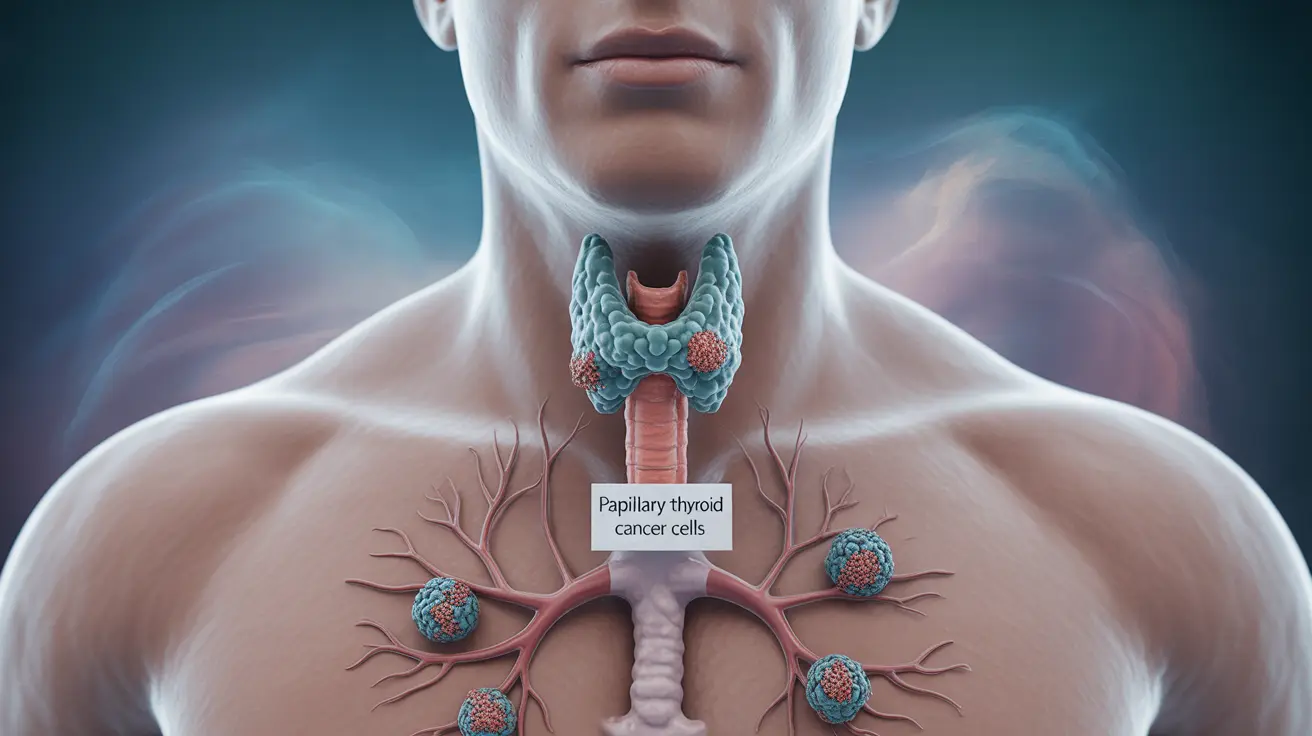Metastatic papillary thyroid cancer occurs when cancer cells from the thyroid gland spread to other parts of the body. While papillary thyroid cancer is typically one of the most treatable forms of thyroid cancer, understanding its metastatic stage is crucial for proper management and treatment planning.
This comprehensive guide explores the key aspects of metastatic papillary thyroid cancer, including its symptoms, available treatments, and factors that influence prognosis. Whether you're newly diagnosed or seeking additional information, this resource will help you better understand this condition.
Signs and Symptoms of Metastatic Disease
When papillary thyroid cancer spreads beyond the thyroid gland, it can cause various symptoms depending on where the cancer has metastasized. Common signs include:
- Swollen lymph nodes in the neck
- Difficulty swallowing or breathing
- Persistent hoarseness
- Bone pain (if cancer spreads to bones)
- Chronic cough (if cancer spreads to lungs)
- Unexplained weight loss
- Fatigue
Diagnosis and Staging
Accurate diagnosis of metastatic papillary thyroid cancer requires comprehensive testing and imaging. Healthcare providers typically use:
- Ultrasound imaging
- CT or MRI scans
- PET scans
- Blood tests for thyroid hormone levels
- Tissue biopsies
Treatment Approaches
Radioactive Iodine Therapy
Radioactive iodine (RAI) therapy remains a cornerstone treatment for metastatic papillary thyroid cancer. This targeted approach works because thyroid cells naturally absorb iodine, allowing the radioactive treatment to specifically target cancer cells while minimizing damage to healthy tissue.
Surgery
Surgical intervention may be necessary to remove the primary tumor and affected lymph nodes. The extent of surgery depends on the cancer's spread and location of metastases.
Targeted Therapies
For cases resistant to radioactive iodine treatment, several targeted therapy options are available:
- Lenvatinib
- Sorafenib
- Other tyrosine kinase inhibitors
Monitoring and Follow-up Care
Regular monitoring is essential for managing metastatic papillary thyroid cancer. This includes:
- Periodic imaging scans
- Regular thyroid function tests
- Thyroglobulin level monitoring
- Regular physical examinations
Prognosis and Survival Factors
Several factors influence the prognosis of metastatic papillary thyroid cancer:
- Age at diagnosis
- Location and extent of metastases
- Response to radioactive iodine therapy
- Genetic mutations present in the cancer
- Overall health status
Frequently Asked Questions
What are the common symptoms and signs of metastatic papillary thyroid cancer?
Common symptoms include swollen lymph nodes in the neck, difficulty swallowing, hoarseness, bone pain (if spread to bones), persistent cough (if spread to lungs), unexplained weight loss, and fatigue. The specific symptoms depend on where the cancer has spread.
How is metastatic papillary thyroid cancer typically treated and what are the treatment options?
Treatment typically involves a combination of approaches, including radioactive iodine therapy, surgery to remove the thyroid and affected lymph nodes, and targeted therapies. The specific treatment plan depends on factors such as the extent of spread and response to initial treatments.
What factors affect the prognosis and survival rates for metastatic papillary thyroid cancer?
Prognosis is influenced by age at diagnosis, location and extent of metastases, response to radioactive iodine therapy, presence of specific genetic mutations, and overall health status. Early detection and appropriate treatment can significantly impact survival rates.
Can radioactive iodine therapy help treat metastatic papillary thyroid cancer that has spread to other organs?
Yes, radioactive iodine therapy can be effective in treating metastatic papillary thyroid cancer that has spread to other organs, particularly if the cancer cells retain their ability to absorb iodine. Success rates vary depending on the individual case and location of metastases.
What are the latest targeted therapies available for metastatic papillary thyroid cancer that does not respond to iodine treatment?
Current targeted therapies include lenvatinib and sorafenib, which are tyrosine kinase inhibitors. These medications can help control cancer growth in cases where radioactive iodine therapy is ineffective. New targeted therapies are continually being developed through clinical trials.




